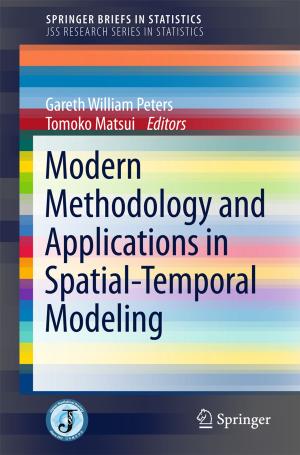Fertility Decline and Background Independence
Applying a Reaction-Diffusion System as a Stochastic Process
Nonfiction, Social & Cultural Studies, Social Science, Demography, Sociology| Author: | Shuichirou Ike | ISBN: | 9784431551515 |
| Publisher: | Springer Japan | Publication: | August 3, 2015 |
| Imprint: | Springer | Language: | English |
| Author: | Shuichirou Ike |
| ISBN: | 9784431551515 |
| Publisher: | Springer Japan |
| Publication: | August 3, 2015 |
| Imprint: | Springer |
| Language: | English |
In this book the author maintains that fertility declines independently of its “background”. Normally, fertility decline is thought to occur as a result of alteration in the socioeconomic background such as the decline of the infant mortality rate, urbanization, the level of literacy, and so on. This point of view has been regarded as equivalent to “demographic transition”. However, the concept of demographic transition is so superficial, naïve and unscientific that it should be applied merely to the ostensible demographic phenomena, not to the mechanisms of fertility decline. The author regards this way of thinking, i.e., that the occurrence of fertility decline is dependent on socioeconomic background, as the “background dependence” of fertility decline. On the contrary, there is considerable counterevidence to the background dependence of fertility decline. The argument is made that background dependence lacks positive evidence and predictability and consequently, is falsifiable. That decisive counterevidence is introduced in this book. The author revives the diffusion hypothesis of fertility decline at the point of the number of children per couple as the reaction–diffusion process in a mathematical equation. Fertility decline in Europe in the eighteenth and nineteenth centuries occurred as a reaction–diffusion process independent of socioeconomic background. In Japan as well, fertility (the number of children per couple) declined independently of background. This book provides ample evidences persuasively demonstrating this independence of fertility in Japan. The occurrence of marriage is also independent of socioeconomic background. Thus the author formalizes the marriage function as an integral equation of marriage probability, as a result, it demonstrates a better fit with the observed data than does any other marriage function. Occurrence of marriage is almost solely dependent on the density of marriages that occur in a given subspace.
In this book the author maintains that fertility declines independently of its “background”. Normally, fertility decline is thought to occur as a result of alteration in the socioeconomic background such as the decline of the infant mortality rate, urbanization, the level of literacy, and so on. This point of view has been regarded as equivalent to “demographic transition”. However, the concept of demographic transition is so superficial, naïve and unscientific that it should be applied merely to the ostensible demographic phenomena, not to the mechanisms of fertility decline. The author regards this way of thinking, i.e., that the occurrence of fertility decline is dependent on socioeconomic background, as the “background dependence” of fertility decline. On the contrary, there is considerable counterevidence to the background dependence of fertility decline. The argument is made that background dependence lacks positive evidence and predictability and consequently, is falsifiable. That decisive counterevidence is introduced in this book. The author revives the diffusion hypothesis of fertility decline at the point of the number of children per couple as the reaction–diffusion process in a mathematical equation. Fertility decline in Europe in the eighteenth and nineteenth centuries occurred as a reaction–diffusion process independent of socioeconomic background. In Japan as well, fertility (the number of children per couple) declined independently of background. This book provides ample evidences persuasively demonstrating this independence of fertility in Japan. The occurrence of marriage is also independent of socioeconomic background. Thus the author formalizes the marriage function as an integral equation of marriage probability, as a result, it demonstrates a better fit with the observed data than does any other marriage function. Occurrence of marriage is almost solely dependent on the density of marriages that occur in a given subspace.















